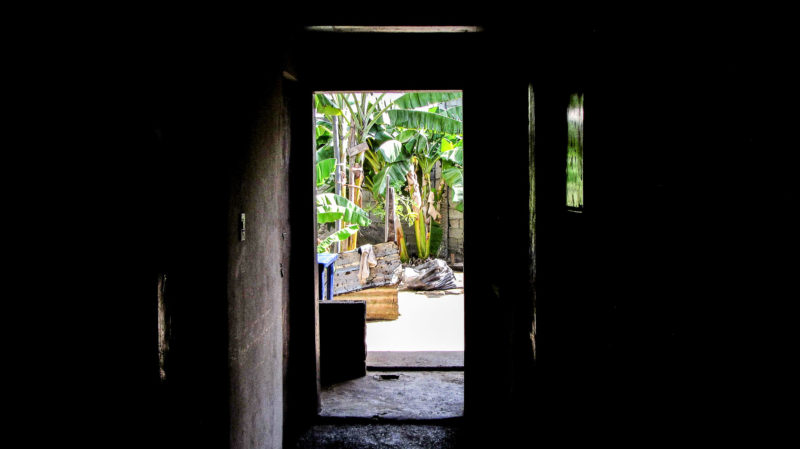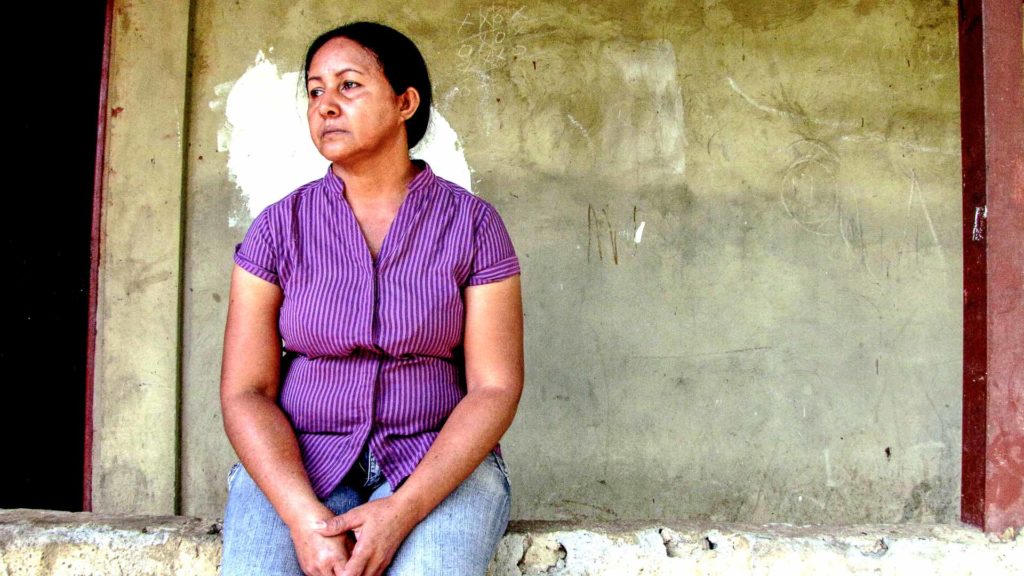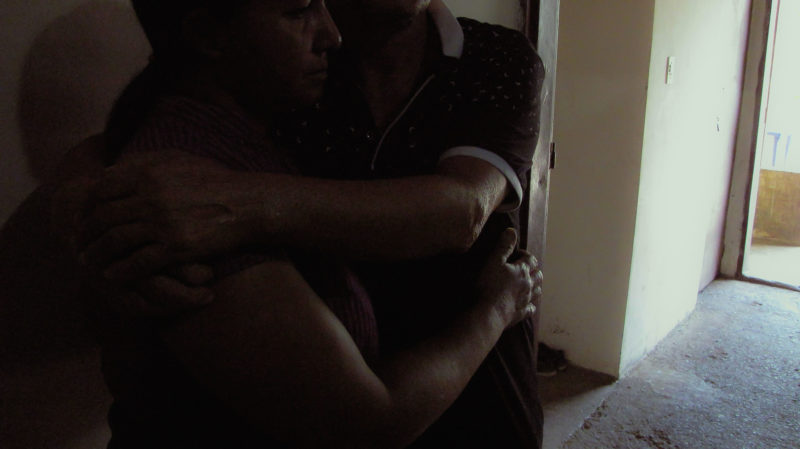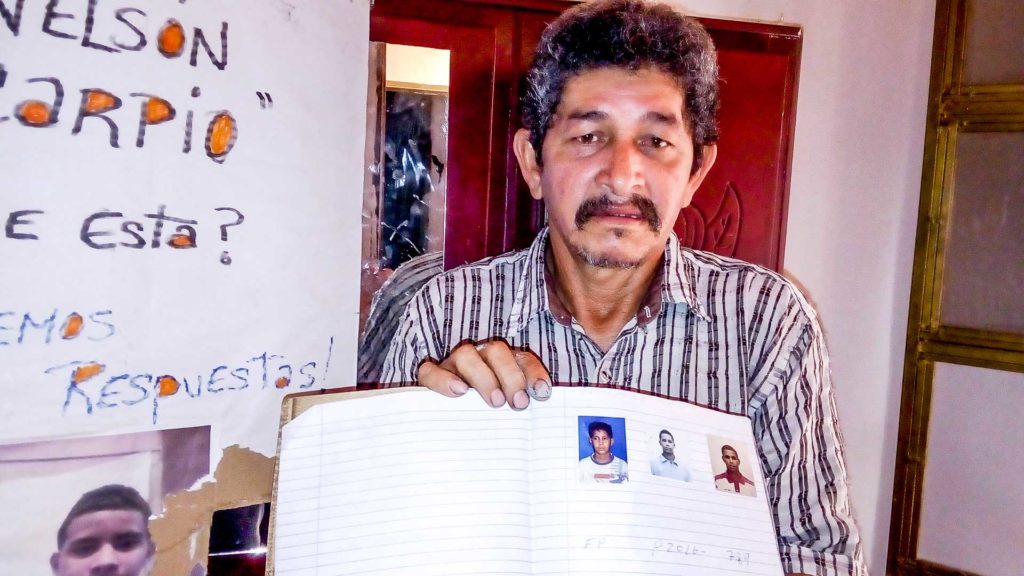

One November morning of 2015, one of the five children of Edgar Carpio and Eladia Guarisma borrowed a bicycle and rode away from his home located in San Felix, southern Venezuela. His plan was to begin a new life, but he never came back home. Witnesses saw police officers taking him away. The family has inquired for him at all the possible legal instances, but nobody can account about his whereabouts.
 Photographs: Raúl Vejar Williams
Photographs: Raúl Vejar Williams
Once again, the sound of weeping goes through the hallway and hits the wall of the couple room. Edgar wife is not in bed. He immediately realized what is going on. It is nothing new: his son Nelson is still missing. One more time, wearing his night clothes, Edgar crosses the sheet -used as a curtain to separate the hall from the living room-, and sees her in the gloom. Eladia Guarisma, his wife, is crying.
The woman is mired in another of her crises, but this time it seemed more intense: the crying and moans are out of control, heartbreaking, filled with memories. Weeping she explains to her husband that she had just dreamt again -after so many years of disappearance-, that Nelson has returned home, that he has crossed the main door threshold -that black gate in between deteriorated pink walls-, and greeted her and asked for her blessing. But in her dream, she only can see a blur of her son’s face, and his body is covered with bruises and scratches.
But in the real world there is not even a trace of Nelson. That night the air in the living room feels heavy. Edgar takes his wife by the arm and opens the door to the courtyard. They go outside. They feel the breeze of that dawn, which seemed colder than ever. The world is different outside. Still weeping, she takes a breath. They both sit on the floor. And in a sincere act of communion, Edgar burst into tears with her. They embrace under the moonlight. The black gate is closed.
It is not the first, nor the last night of insomnia.
The dark circles under Eladia’s eyes are two dark hammocks that over the years have grown in layers. Every night she has nightmares with her son: she returns to the past again and again, to that moment when her son, Nelson, leaves home to never come back.
Nelson Omar Carpio Guarisma disappeared on November 17, 2015.
That morning, Edgar Carpio was not at home. The father was out sorting out work issues, looking for merchandise in El Roble, a sector of San Felix, in the state of Bolivar, where he used to purchase engine oils to resell on the Manuel Piar Avenue. This enabled him to support his family of five children with his wife Eladia, who was there to see when her 17-year-old left home before he vanished.
She got up at 5:00 in the morning to take a shower to go to the store, as she did every day of the week. An hour later she felt Nelson silently brushing his teeth and dressing. It was then when they met in the living room of the house, located in San José de Chirica, a neighborhood of San Felix east of Ciudad Guayana.
“Are you going to classes?” She asked him.
He had just started a barbershop course. It was the way for him to overcome old demons and start a new life, while studying at the Ribas Mission to finish high school. He had just been released after nine months committed at the Instituto Nacional de Atención al Menor (National Institute of Child Care, a juvenile prison) for an alleged robbery.
“Yes,” he said.
If Eladia memory serves her correctly, that was the last word she heard from her son. Brief, unambiguous, without details. Shortly after, when he finished dressing up, she heard the fence at the entrance of the house closing: that black gate, located between pink walls that have never been repainted since that day.
He was wearing gray shorts, blue T-shirt, a koala-type bag, blue sandals and rode a borrowed bicycle. That is the image that stuck in Eladia’s memory since that Tuesday.
At around 7:00 am, with her tanned skin, wearing a jean skirt that covered her knees, she went to work the family’s engine oil store. While her husband did errands, she took care of the business. She walked to the store, because it was close, a few blocks away.
However, what began as a peaceful day lasted only two hours. Edgar Jr., 22, the second of the five siblings, came into the store. He was sweaty, nervous, with a face of horror.
“Mom, it seems they took Nelson”.
One witness told a neighbor; that neighbor told the other; and another told Edgar, and he ran to break the news to his mother. Eladia went to speak with one of the witnesses, in San José de Chirica, inquiring about the facts. And she began to put together the story, like a puzzle.
The boy was riding a borrowed bicycle heading through the Manuel Piar avenue when a vehicle of the Bolívar State Police stopped him. Inside the police patrol were four officers from the Francisca Duarte Police Coordination Center. They requested his identity card and Nelson, without any resistance, showed his ID. But then the aggressions started, so the blows to the head and the pushing. They arrested him: abruptly they made him get into the patrol car.
Eladia was shocked by the short story. She thought that it could be routine procedure. Things are like that in the Bolívar state. “They detain and release boys, at their whim,” she thought. She calmed down and went alone to the Francisca Duarte Police Coordination Center, with the conviction that Nelson was there.
The sun was burning that Tuesday, November 17.

After 3:00 pm, the father, Edgar Carpio, returned home and was filled in with the news. He lost his patience talking to his son.
“Why did let your mom go alone!?
“Dad, don’t worry. Perhaps they just took him for the borrowed bicycle”, the boy replied, trying to calm him down.
The father decided to take a deep breath and calm down. “For sure it’s only a routine procedure,” he thought. “Yes, surely it is a misunderstanding regarding the bicycle; we know how those guys are, for sure Nelson defied them or so.”
Meanwhile, Eladia was touring San Felix. No news about Nelson at the Francisca Duarte Police Station “He is not here,” a headquarters officer told her, and did not give her any hint at where he might be. She inquired for him at the police station in Guaiparo. Again, no news. Then she went to the headquarters of the Corps of Scientific, Criminal and Criminal Investigations (CICPC, in Spanish). There an uniformed woman, indifferently, asked one of her superiors if “a certain Nelson Carpio” was there.
Nothing. Nothing. Nothing. His name was not in any police record book. It became clear this was not a routine procedure and, when Eladia realized this, she felt a void in her stomach.
Sad, she returned home, overwhelmed with questions, and sunburned after a whole day of searching for her son. Edgar was there waiting for her.
“I couldn’t find Nelson. The police took him.”
Her words wove layers of anguish. Anger marred the eyes of her husband, and he decided to go himself to inquire again at Francisca Duarte Police Station.
“No sir. There is no Nelson Carpio here,” they repeated.
With anything else to do for that day, the sun begins to hide.
The Carpio Guarisma’s home has a barred porch that faces the street. During the day, natural light enters only through the patio and from the two windows of Nelson’s room. At night the house turns dark, especially when some bulbs are missing. In Nelson’s room his computer, sitting on a piece of wooden furniture, is turned off. The empty bed. The closet filled with his clothes. On the walls, handwritten poems that he dedicated to his girlfriend; a cuddly toy with “I love you” sign. His things are intact, as expecting for him.
Night comes, but not Nelson.

Edgar imagines his son has been beaten. Eladia wept. That first night went between arguments and tears. They slept little. The younger children just listened to them.
“So now what, Edgar”? Eladia asked.
“I do not know, Elai, I do not know,” he replied, using the affectionate nickname with which he referred to her.
Edgar is a short man, although taller than his wife. Not very robust, stooped over, gray hair combed up and sparse mustache, features that give a touch of kindness, tenderness and familiarity to his looks. He looks like that kind of uncle who always brings gifts or jokes.
For almost a year, the family went through an economic downturn that forced him to rummage in the dumpsters trying to find metals, cardboard and plastic to sell in order to bring food home. But the engine oil business began to prosper in 2015, the same year in which inflation in the country, according to the Central Bank of Venezuela, reached 200%.
Edgar wanted Nelson to get involved in the family business, as Edgar Junior did, but he did not have the will. But to tell the truth, the father was happy that he had been released from the INAM and studying. But now a new storm was building at their home.
He calmed down He looked at his wife and, perhaps to try to resist, he thought: “She is going through something worse, because she is the mother.”
“Well, woman. We have to fight until the end,” he told her then, firmly, with all the love he had for her.
Afterwards they wept together.

It is November 2018, three years after Nelson Carpio disappearance. Eladia and Edgar have not lost track of time. The first week was of constant searches. Both moved dozens of people: among friends and family, they checked every corner of Guayana’s city, asking in police stations and detention centers, in mortuaries and hospitals, in churches and houses. Every day. That same first week, they filed a complaint of his disappearance at the Public Prosecutor and the CICPC.
Gray shorts, blue T-shirt, a koala-type bag, blue sandals and rode a borrowed bicycle. The usual descriptions, the usual questions, the usual answers, the usual results.
The parish priest of the Brisas del Sur church, Father Carlos, took them to the Comisión para los Derechos Humanos y la Ciudadanía (Commission for Human Rights and Citizenship), a civil society organization. During the second week of Nelson’s disappearance, the couple went back to the Francisca Duarte Police Coordination Center, but this time with a lawyer from the Ombudsman’s Office and a new requirement: a warrant for the headquarters’ novelty book, where records of any detention or release of the police center was kept. That book could give them any clues about the young man’s whereabouts.
“You know he’s not there,” the officer answered sharply, when just listening to the name of Nelson Carpio.
“I want to see the commander,” the lawyer replied.
“You can’t talk to the commander, counselor. He’s not in.”
“And his substitute?” The counselor requested.
The official called someone else, who arrived -ill-faced, without much will to help.
“I can’t give you the book; you need an authorization from the commander.”
Their request was not answered.
During one of those first weeks after Nelson’s disappearance they received a visit. “The commander is coming to talk to you,” a neighbor told them. Puzzled they waited for her to arrive. “Surely she brings good news about Nelson – they said to themselves -, something good is coming.”
A police vehicle arrived with two other officers: a man and a woman, both with weapons. It was 7:00 pm. They talked in front of the house.
“They told me you have a complaint against me,” the woman officer said.
“It is not against you. It’s against cops at your headquarters”, Edgar replied.
Eladia, just listened to them.
“But how do they look like?”, the officer asked.
One of the neighbors -who witnessed the disappearance of Nelson- was there with the family and intervened in the conversation.
“One looks just like that officer you have beside you.”
Eladia and Edgar saw her annoyed face. She tried to make them believe she was the victim and that the Carpios were her victimizers. The couple could feel that the officer was nervous. And after detailing the patrol, they could say it looked just like the one the neighbors had seen that day.
A month has passed since the disappearance. No holidays celebrations took place in the Carpio Guarisma home that December. Christmas without Nelson, New Year without Nelson. They listened to the traditional Christmas music at full volume played in the nearby houses.

Edgar can’t forget that Monday, November 16, 2015, the day he saw his son for the last time. It was night time and he, who was not very talkative with Nelson, wanted to joke about his girlfriend. “Be nice with the girl. Be careful of making her pregnant.” Nelson laughed.
The worst days of Eladia are those in which he appears in her dreams. And that happens frequently.
“When you lose a child like this, so suddenly … it’s something tremendous” – she says.
And every morning she wakes up wanting to cry, with a pressure in her chest, without the will to do chores or help at store. Anyway, she keeps on going, because she is one of the family’s pillars. Despite of the bitter Decembers and the bitter months.
Edgar and Eladia continues their legal pressure: 14 months later, the officer Francisca Duarte police station in command is charged for the disappearance of Nelson. Two officers from the same center are also accused. In 2018, one of them, goes before a judge of the First Court of Control of the Criminal Judicial Circuit, extension Bolivar, and is sentenced to house arrest, due to problems in one leg. The family, together with the Codehciu organization, appeals this decision, which is revoked in August of the same year.
In 2016, the case is referred to the Working Group on Enforced or Involuntary Disappearances of the United Nations. This same instance sends it to the Government of Venezuela, but to date there hasn’t been any response. Currently it is known that the accused commander officer is free and works in another police coordination center, in a different municipality.
In the meanwhile, the Carpio Guarisma family continues waiting for a sign, new data, or even a corpse.
“I dreamed again about him. That he was here, that he had returned. But I couldn’t see his face. Nelsito was here in the house. In the dream, I grab him and hug him and I felt like crying. I woke up crying.”
A faceless Nelson, opens the black gate in Eladia’s nightmares. Three years having the same dream.
Translation: Josefina Blanco

Note: This is a story of the Venezuelan website La vida de Nos. It is part of its project La vida de Nos Itinerante, which develops from storytelling workshops for journalists, human rights activists and photographers coming from 16 states of Venezuela.
2263 readings
I am a journalist from Guayana and I love literature and cinema. My heart beats for social justice, democracy and human rights causes.
2 Comentario sobre “Nelson Only Returns in Nightmares”